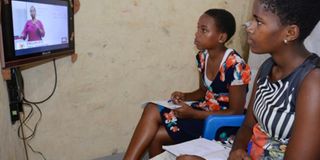Prime
Covid puts 53 million girls out of school in Africa

Girls follow lessons on a television set. Experts advise governments across the sub-Sahara Africa to make changes in learning to ensure that girls stay at school.
PHOTO/ COURTESY
What you need to know:
An official from UK urges governments to help children remain at school amid the pandemic.
At least 53 million girls of primary and secondary school-going age in sub-Saharan Africa have remained at home as Covid-19 pandemic takes toll on education, a UK official has noted.
Children across the world have also lost an average of one third of education calendar years each due to school closures and a lack of access to remote learning.
These figures form part of agenda for 2021 global education summit to be co-hosted by the United Kingdom and Kenya.
The two-day summit, which will take place next week, aims at finding solutions to the global education problems.
Latest data indicate that as of March, close to half the world’s students are out of school worldwide due to partial or full school closures linked to the coronavirus pandemic.
While briefing journalists in Kampala yesterday, Mr James Duddridge, the UK Minister for Africa at the Foreign, Commonwealth & Development Office, said the pandemic presents a global challenge which must be confronted by all governments and other stakeholders in the education sector. He said education is a game changer which must be embraced and supported to help children remain at school.
Duddridge said the situation has been worsened the lockdowns that have continued to plague many countries.
“Even before the pandemic, we were facing a global education crisis. Across sub-Saharan Africa, 33 million girls of primary and lower secondary school education are out of school. This number has risen to more than 52 million when taking into account girls of upper secondary age. This has been exacerbated by Covid-19. The knock-on effect to learning is significant so we need to make a change – we need to do something differently,” he said.
Mr Duddrige warned that the world risks losing a generation of girls if no action is taken to save them from dropping out of schools completely and that this must never be allowed to happen.
“We know that girls have been disproportionately affected by the pandemic. This has a compounding effect on the barriers to an education they were already facing the issues of child marriage, gender-based violence, female genital mutilation and human trafficking. We risk losing a generation of girls and missing an opportunity. We cannot let this happen. And we will not let this happen,” he said.
Mr Duddrige said statistics show that $28 trillion could be added to the global economy if women had the same role in the labour market as men.
“Educated women earn more across sub-Saharan Africa – one year of additional schooling can increase a woman’s lifetime earnings by around 12 per cent. A child whose mother can read is 50 per cent more likely to live beyond the age of five years, twice as likely to attend school themselves, and 50 per cent more likely to be immunised. This has a real catalytic effect,” he said.
Mr Duddrige said the UK Foreign Secretary set ambitious goals of getting 40 million more girls in school, and 20 million more girls reading by age 10, or at the end of primary school in lower and middle-income countries by 2026.
“Last month, the UK made our biggest ever pledge to GPE, £430m additional money to get the world’s most vulnerable children, particularly girls, into school. This is the second largest pledge ever made to GPE - an increase of 15 per cent on our [previous] annual pledge and the largest bilateral pledge so far. This is a strong testament to the UK’s commitment to this crucial issue,” he said.
Mr Duddgridge urged other development partners to follow the UK’s example by increasing funding to education.



